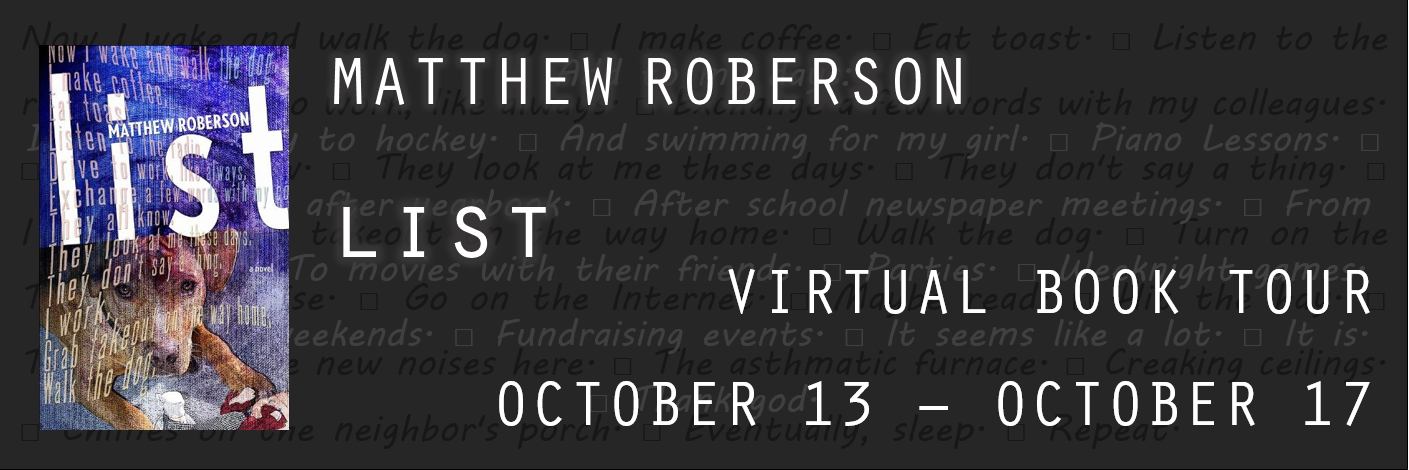Melanie Page of GRAB THE LAPELS
Presents
a Conversation with Matthew Roberson
Synopsis—Vignettes of a middle-class American family told through lists, each reflecting their obsessions, their complaints, their desires, and their humanity.
A suburban family of four—a man, woman, boy, and girl—struggle through claustrophobic days crowded with home improvement projects, conflicts at work and school, a job loss, illnesses, separation, and the wearying confrontation with aging. The accoutrements of modern life—electronic devices and vehicles—have ceased to be tools that support them and have become instead the central fulcrums around which their lives wheel as they chase “cleanliness” and other high virtues of middle American life.
Melanie Page: Could you tell me a little about the origins of List? How did you begin this work?
Matthew Roberson: The book started as a series of stories. I originally figured all the stories would revolve around “middles”–being middle class, in the Midwest, and middle-aged, stuck in the middle between children and aging parents. As the book went on, the male character was between jobs. The parents eventually in the middle of a divorce. I was really taken with the title, Lucky Middle. But then I noticed that the real unifying element of all the stories were the lists. Every story was built around a list. So, I kept on with that.
MP: What are some ways List is different than your previous novels?
MR: List is more straightforward, both in the prose and the overall construction. My previous books really toyed with sentence and form. One used very few periods. One was chock-full of footnotes. List is much more direct, though I did work very hard in it to make every sentence count. Some part of me wants to believe the book is as much poetry as fiction.
MP: In his blurb on the back of List, Michael Mejia writes, “Roberson demonstrates once again that he is a master of contemporary sadness.” So, sadness is a theme you’ve worked with before? What is it that draws you to write about sadness?
MR: As a person, I’m pretty chipper. And lucky. I’ve got a wonderful family, a career I love. I think, though, that in between our more upbeat moments, if we’re watching carefully, the world reveals itself to be awfully unfair, disappointing, heartbreaking, in small ways. And I like to capture those small frustrations, because they’re the ones we all share and can recognize—and they can also be funny, in a lot of cases, because they’re not world-ending catastrophes. For example, you’re middle-aged and will never now be able to learn to play a musical instrument the way you could have if you’d applied yourself earlier. And you really want to learn. And you won’t. Heartbreaking. And ridiculous. And, no, that’s not something I’ve yet written about.
MP: The houses in List almost becomes characters themselves; they are ever-present as things that need care. Could you talk a bit about the relationship between owners and houses?
MR: Damn houses. They’re the neediest goddamn things. I work like a dog all week so that I can get all my work work done, so that I can spend the weekend fixing my fence or putting heating coils on the low pitch of the roof, so that we won’t get more ice dams that will bust through and leak into the downstairs bathroom. You know what I mean? Constant maintenance. And that’s not even getting into the various improvements, which you want to do to make quality of life okay. A new backsplash in the kitchen. Floors that are refinished and don’t splinter into your socked feet. And you know what? Some people enjoy doing that maintenance. Not me.
MP: The story of fathers glued to couches, mothers who feel underappreciated, and kids who fight over what to watch on TV is pretty familiar. How do you go about “making it new” and appealing to readers?
MR: Right?! Sometimes I wonder if I’m just rewriting the Cosby Show for the contemporary world. But then I think about two important sides to what I hope I’m doing. On one side, I’m showing the frustrations of domestic life in a relatively stark, honest ways, and the showing is all about digging into complicated characters. I hope there’s a level of frankness in my work that’s new. And on the flip side, I try to show all this in a constant humor that’s not unkind but about absurdity, and I really believe my humor is my own–true to my voice.
MP: Domestic fiction is largely written by women (Lynn K. Kilpatrick, Kelcey Parker, Jane Shapiro). Very few men get into domesticity as a main setting or theme. Could you talk about your choice to explore this territory?
MR: On one level, it’s “write what you know.” For the last fifteen years or so the most important part of my life has been my family and raising our kids and walking the dogs, so I necessarily want to focus on what that experience is like—especially for a man who’s much more involved in that world than men typically used to be. I don’t, of course, write about my own experiences, but I do draw from them to tell a larger story. And, also, as I try to show that world to readers, maybe I can start to figure it out better for myself. There’s that selfish component.
MP: Who do you imagine as your audience for this book? Would List make a good book club pick?
MR: A couple of local book clubs have read it, and they’ve let me know in a couple ways that a) they liked it! and b) it made for good conversation. Where b is concerned, I think List really does dig into a lot of familiar frustrations we all face and will certainly allow readers to relate and share their own experiences. Both clubs were women’s reading groups, by the way. I don’t know if that’s relevant. You don’t run across a lot of men’s reading groups. That’s kind of a shame. One of the women from one of those groups talked to me at a separate event, and she said the book really gave her perspective on the male domestic experience. I’d hope it would do the same, flipped, for male readers. The woman I spoke to also said that List made her feel a terrific sympathy for her husband. Alternately, it also made her feel like she really needed some time away from him. I think she was kidding!
If you missed yesterday’s virtual book tour stop, head over to Book Puke to read an excerpt + insight from List. Tomorrow, visit Words, Notes, & Fiction to read a meta-list.
 Matthew Roberson is the author of three novels, 1998.6, Impotent, and List, and the editor of a critical book, Musing the Mosaic. His short fiction has appeared in journals such as Fourteen Hills, Fiction International, and Western Humanities Review. He teaches at Central Michigan University, in Mount Pleasant, Michigan.
Matthew Roberson is the author of three novels, 1998.6, Impotent, and List, and the editor of a critical book, Musing the Mosaic. His short fiction has appeared in journals such as Fourteen Hills, Fiction International, and Western Humanities Review. He teaches at Central Michigan University, in Mount Pleasant, Michigan.
![[PANK]](https://pankmagazine.com/wp-content/themes/pank/assets/images/pank-logo-large.png)

